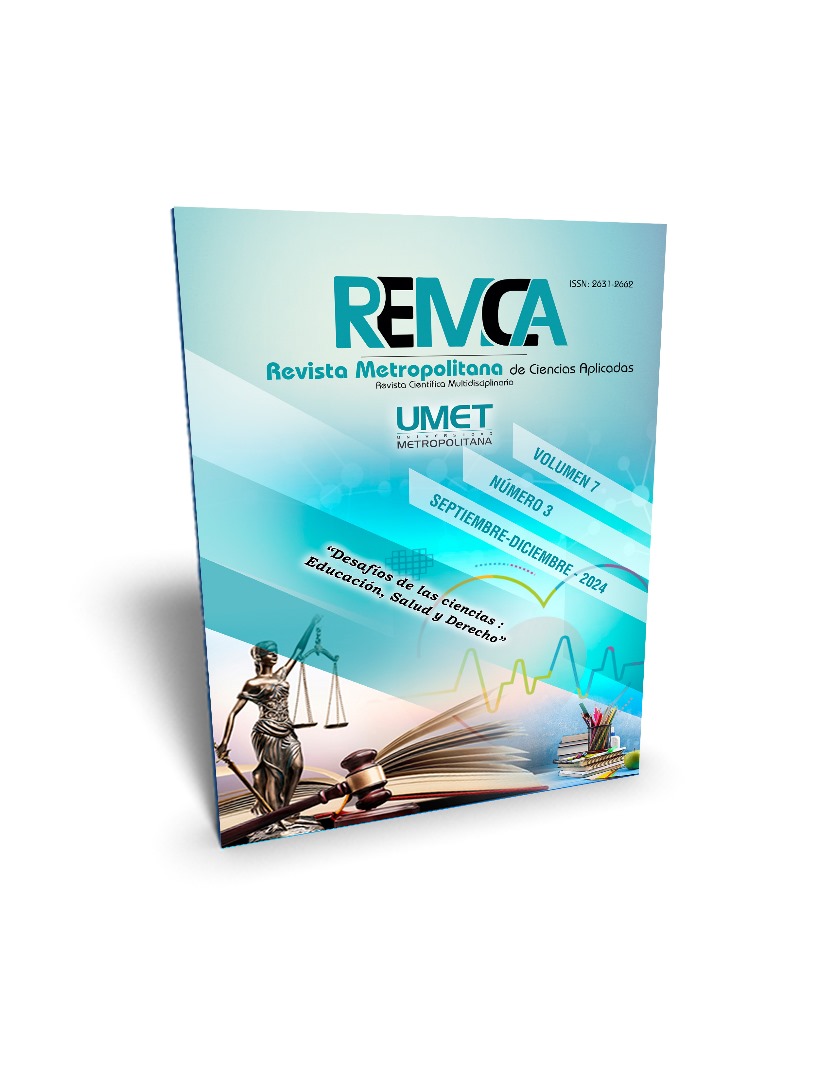Los beneficios penitenciarios Vs el Principio de Celeridad. Una visión desde la realidad ecuatoriana
DOI:
https://doi.org/10.62452/73fnxy52Keywords:
Penitentiary benefits, social rehabilitation regulations, chrysomelid, Ecuadorian penitentiary lawAbstract
In Ecuador, once, as a result of a due criminal process, a person is found responsible for a criminal act, the penalty of deprivation of liberty is generally imposed, which involves the Ecuadorian penitentiary system. In this, respect for procedural speed, as a constitutional and legally conceived principle, plays a transcendental role. This is because the effectiveness of these processes and the fulfillment of the purposes of the sentence depend on it. Therefore, motivating this research, this topic is proposed as a general objective: Identify the impact caused by the legal process to grant prison benefits, which includes the certification of the commission with respect to the evaluation of people deprived of liberty to obtain benefits such as pardons, repatriations and semi-open and open regimes, granted by the Comprehensive Care Service for Adult Persons Deprived of Liberty and Adolescent Offenders (SNAI). To this end, a qualitative methodological approach is applied, with scientific methods such as historical-logical, exegetical and analytical-synthetic, managing to expose the procedural reality of the Ecuadorian penitentiary system regarding penitentiary benefits and their processing.
Downloads
References
Barron, M. (2012). Cárcel de Apodaca: haciendo leña del árbol caido. Revista Penal México, 2(3), 59-76. https://rabida.uhu.es/dspace/bitstream/handle/10272/14259/carcel_de_apodaca.pdf?sequence=2
Cárdenas, M., & Vásquez, J. (2021). Vulneración al principio de progresividad y no regresividad del beneficio penitenciario semiabierto, en las reformas al Código Orgánico Integral Penal en el Ecuador. Revista Científica FIPCAEC, 6(1), 3-32.
Comisión Interamericana de Derechos Humanos. (2022). Personas Privadas de Libertad en Ecuador. https://www.oas.org/es/cidh/informes/pdfs/Informe-PPL-Ecuador_VF.pdf
Corte Constitucional del Ecuador. (2019). Dictamen n.º 4-19-EE/19. https://www.corteconstitucional.gob.ec/dictamen-no-4-19-ee-19-renovacion-estado-excepcion/
Corte Constitucional del Ecuador. (2021). Dictamen No. 5-21-EE/21. http://esacc.corteconstitucional.gob.ec/storage/api/v1/10_DWL_FL/e2NhcnBldGE6J3RyYW1pdGUnLCB1dWlkOic2MjVlZjBkNy0zZTA1LTQ5ZWEtYmY0Ny1iNjBiNWQ3ZTJkM2UucGRmJ30=
Ecuador. Asamblea Nacional Constituyente. (2008). Constitución de la República del Ecuador. Registro Oficial No.449. https://www.oas.org/juridico/pdfs/mesicic4_ecu_const.PDF
Ecuador. Asamblea Nacional. (2014). Código Orgánico Integral Penal. Registro Oficial No.180. http://esacc.corteconstitucional.gob.ec/storage/api/v1/10_DWL_FL/eyJjYXJwZXRhIjoicm8iLCJ1dWlkIjoiMjkwYzMxODUtNTY0OC00MzNjLTk1ZDEtZDg0NjY1NDc5NWI0LnBkZiJ9
Ecuador. Instituto Nacional de Estadisticas y Censo. (2023). Ecuador en cifras. https://www.ecuadorencifras.gob.ec/institucional/
Ecuador. Servicio Nacional de Atención Integral a Personas Adultas Privadas de la Libertad y a Adolescentes Infractores. (2020). Reglamento del Sistema Nacional de Rehabilitacion Social. https://www.atencionintegral.gob.ec/wp-content/uploads/2020/08/Reglamento-del-SIstema-de-Rehabilitacio%CC%81n-Social-SNAI-2020_compressed.pdf
Mapelli, B. C. (2019). Algunas cuestiones relacionadas con las garantías jurídicas de los beneficios penitenciarios. Anuario de derecho penal y ciencias penales, 72, 31-54. https://dialnet.unirioja.es/descarga/articulo/7059245.pdf
Montecé Giler, S. A., & Alcívar López, N. de L. (2020). El sistema penitenciario ecuatoriano. Uniandes Episteme, 7, 676–694. https://revista.uniandes.edu.ec/ojs/index.php/EPISTEME/article/view/2110
Valdez, C., Valmaña, S., & Tellez, A. (2000). Diccionario de ciencias penales: criminología, derecho penal, derecho penitenciario y derecho procesal penal. Edisofer.
Verdugo, J. (2022). La realidad penitenciaria en el Ecuador. Foro, (39), 87-105. https://doi.org/10.32719/26312484.2023.39.5
Downloads
Published
Issue
Section
License
Copyright (c) 2024 Sonia Mercedes Osorio-González, Yudith López-Soria, Holger Geovannny García-Segarra (Autor/a)

This work is licensed under a Creative Commons Attribution-NonCommercial-ShareAlike 4.0 International License.
Authors who publish in Revista Metropolitana de Ciencias Aplicadas (REMCA), agree to the following terms:
1. Copyright
Authors retain unrestricted copyright to their work. Authors grant the journal the right of first publication. To this end, they assign the journal non-exclusive exploitation rights (reproduction, distribution, public communication, and transformation). Authors may enter into additional agreements for the non-exclusive distribution of the version of the work published in the journal, provided that acknowledgment of its initial publication in this journal is given.
© The authors.
2. License
The articles are published in the journal under the Creative Commons Attribution-NonCommercial-ShareAlike 4.0 International License (CC BY-NC-SA 4.0). The terms can be found at: https://creativecommons.org/licenses/by-nc-sa/4.0/deed.en
This license allows:
- Sharing: Copying and redistributing the material in any medium or format.
- Adapting: Remixing, transforming, and building upon the material.
Under the following terms:
- Attribution: You must give appropriate credit, provide a link to the license, and indicate if any changes were made. You may do this in any reasonable manner, but not in any way that suggests the licensor endorses or sponsors your use.
- NonCommercial: You may not use the material for commercial purposes.
- ShareAlike: If you remix, transform, or build upon the material, you must distribute your creation under the same license as the original work.
There are no additional restrictions. You may not apply legal terms or technological measures that legally restrict others from doing anything the license permits.




